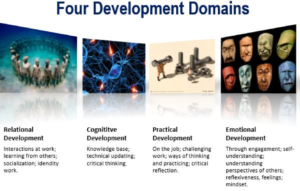Four domains of learning

I came upon this text today when I was seeking to extend on an article I was writing that included the idea of learning in four domains. It was produced, I think, for the EmployID MOOC on the Changing World of Work and was probably written by Alan Brown and Jenny Bimrose.Sadly, I was so tied up with producing my own materials for the MOOC and didn’t get to read all of the other peoples. But at a time when there is a growing need to question to division between humanities and technical subjects, I think this offers a good way forward.
Relational development – learning with and from interacting with other people
A major route for relational development is learning through interactions at work, learning with and from others (in multiple contexts) and learning as participation in communities of practice (and communities of interest) while working with others. Socialisation at work, peer learning and identity work all contribute to individuals’ relational development. Many processes of relational development occur alongside other activities but more complex relationships requiring the use of influencing skills, engaging people for particular purposes, supporting the learning of others and exercising supervision, management or (team) leadership responsibilities may benefit from support through explicit education, training or development activities.
Jack from the UK had switched career and now who worked as a carer. From the outset Jack learned much about his work from engaging with residents in the care home as well as learning from other staff. He had received letters from residents expressing their gratitude, which had boosted his confidence. His manager encouraged him to become a trainer in the care home, and although nervous and unsure he delivered the training and his self-efficacy increased.
Cognitive development – acquiring knowledge and thinking skills
A major work-related route for cognitive development involves learning through mastery of an appropriate knowledge base and any subsequent technical updating. This form of development makes use of learning by acquisition and highlights the importance of subject or disciplinary knowledge and/or craft and technical knowledge, and it will be concerned with developing particular cognitive abilities, such as critical thinking; evaluating; synthesising etc.
Bernard, a Czech automotive worker, participated in a short internal company technical training programme which positively surprised him in terms of practical outcomes and motivated him to actively work on his vocational development. ‘You had to know your stuff, the trainer was extremely competent, he knew his field very well, but sometimes I had difficulties to follow him. Anyway, it was really done by professionals who knew their stuff, and I appreciated it very much. I was very satisfied. I learned lots of things that were later very useful for my work […] It was very interesting to meet people from a completely different and a rather specialised area. I learned a lot of things and I was proud of it. I think this was the moment that made me change my attitude towards learning. I became much more curious.’
Practical development – learning by doing, by experience, by taking on challenges
For practical development the major developmental route is often learning on the job, particularly learning through challenging work. Learning a practice is also about relationships, identity and cognitive development but there is value in drawing attention to this idea, even if conceptually it is a different order to the other forms of development highlighted in this representation of learning as a process of identity development. Practical development can encompass the importance of critical inquiry, innovation, new ideas, changing ways of working and (critical) reflection on practice. It may be facilitated by learning through experience, project work and/or by use of particular approaches to practice, such as planning and preparation, implementation (including problem-solving) and evaluation. The ultimate goal may be vocational mastery, with progressive inculcation into particular ways of thinking and practising, including acceptance of appropriate standards, ethics and values, and the development of particular skill sets and capabilities associated with developing expertise.
Davide, an Italian carpenter, saw learning as a practice-based process driven by curiosity, a spirit of observation, and trial and error. A major role was played by his passion for the transformation of matter, which he perceived as an almost sacred event: ‘It really struck me to see that from a piece of wood one can create a piece of furniture’.
Emotional development – making sense of your own feelings and how others feel
For emotional development, the major developmental routes are learning through engagement, reflexiveness that leads to greater self-understanding, and the development of particular personal qualities. Much emotional development may occur outside work, but the search for meaning in work, developing particular mind-sets, and mindfulness may be components of an individual’s emotional development. Particular avenues of development could include understanding the perspectives of others, respect for the views of others, empathy, anticipating the impact of your own words and actions, and a general reflexiveness, which includes exploring feelings. Identity development at work may also be influenced by changing ideas individuals have about their own well-being and changing definitions of career success (Brown & Bimrose 2014).
Henrik from Denmark switched career, moving into caring and developed a new relationship with his work, which he found much more emotionally engaging. While studying for his skilled worker qualification, Henrik immersed himself in individual assignments of his own choice. In one assignment, he developed a ‘product’ to help improve a pupil’s ability to communicate, an ability which was being lost due to a rare disease. When Henrik talked about the assignment he was very engaged and showed insight into the syndrome. Because the assignment was closely related to his experience and practice, he saw meaning in undertaking it: ‘It was as though there was a circle I could complete on my own.’ He received a top grade for the assignment, and it is evident that positive learning experiences and the perception of entering into learning processes that are meaningful to his life and work situation are strong motivating factors in his engagement in further learning.


 A European Framework for Quality and Effective Apprenticeships (2018/C 153/01)
A European Framework for Quality and Effective Apprenticeships (2018/C 153/01)  After years of running down apprenticeship schemes through a policy focus on mass university education, the UK, in common with other European countries, has in the past few years turned back to apprenticeship both as a strategy for providing the skills needed in the changing economy and as a way of overcoming youth unemployment especially or those with low school attainment.
After years of running down apprenticeship schemes through a policy focus on mass university education, the UK, in common with other European countries, has in the past few years turned back to apprenticeship both as a strategy for providing the skills needed in the changing economy and as a way of overcoming youth unemployment especially or those with low school attainment. For years, Jenny Hughes and I have been promising ourselves to submit a paper for the Academic Archers Conference. And this year we have finally got our act together. You can read the short abstract below. But first, for non UK readers what is the Archers? According to Wikipedia:
For years, Jenny Hughes and I have been promising ourselves to submit a paper for the Academic Archers Conference. And this year we have finally got our act together. You can read the short abstract below. But first, for non UK readers what is the Archers? According to Wikipedia:
 Sipping a glass of wine on the terrace last night, I thought about writing an article about proxies. I’ve become a bit obsessed about proxies, ever since looking at the way Learning Analytics seems to so often equate learning with achievement in examinations.
Sipping a glass of wine on the terrace last night, I thought about writing an article about proxies. I’ve become a bit obsessed about proxies, ever since looking at the way Learning Analytics seems to so often equate learning with achievement in examinations.